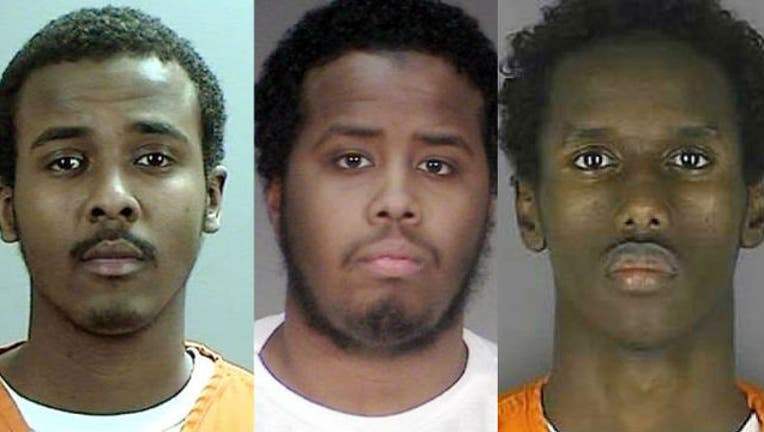Jury selection for Minnesota ISIS trial to continue Wed.

Abdirahman Daud, Mohamed Farah and Guled Omar
MINNEAPOLIS (KMSP) - The judge in the federal terror-related trial of the three Minnesota men accused of trying to leave the United States to join ISIS narrowed the pool of prospective jurors down to 40 people Tuesday.
Tuesday marked day two of jury selection for the trial of Guled Omar, Mohamed Farah and Abdirahman Daud, who are all charged with conspiracy to commit murder outside the United States and conspiracy to provide support to a terror group. Farah and Daud are also charged with perjury and Omar is also charged with attempted financial aid fraud for allegedly taking out a student loan to pay for the trip to Syria.
BACKGROUND - 3 alleged ISIS recruits stand trial in Minneapolis
Every prospective juror questioned faced the same first question: will a trial that lasts up to four weeks cause you any problems? And a fair number of the more than 100 who went through the screening by U.S. District Court Judge Michael Davis didn’t even make it further than that.
Jurors had reported for duty on Monday and waited for their turn to be screened. By the end of Tuesday, Judge Davis had questioned about 100 prospective jurors and narrowed that pool down to 40 people that the attorneys could then begin to question to find their jury of 12.
Jurors began by answering a list of questions designed to pull out anything in their past that might give them opinions that prevent them from being impartial: where they work, whether any family members had ever been charged with a crime or if anyone in their family in was in law enforcement or the military?
One man said his cousin was a Marine who’d been killed in Afghanistan. The judge pulled him for a private conversation with attorneys, as was common with any potential problems, then sent him home, too.
That is one of the biggest issues the judge is trying to weed out: any past life experiences with minorities, other cultures or with terrorism or war that would prevent being impartial. He’s also spent a lot of time asking jurors if they understand that basic tenant of the American justice system - the concept of innocent until proven guilty.
“As you look at the defendants here, do you see them as being guilty of the offenses?” Daivs asked one potential juror.
“No Sir,” the juror said.
“What do you see them as? The fact that they are here does not mean they are guilty. Even if the government has brought terrorism charges against them?” Davis asked.
“Even so,” the juror responded. That man stayed.
Depending on how long the attorneys take to screen the remaining pool of 40 and make their strikes, opening statements should come sometime on Wednesday. The trial is scheduled for two to three weeks and among the evidence to be offered by the government will be some graphic video of acts of violence at the hands of ISIS terrorists.

